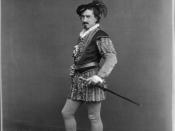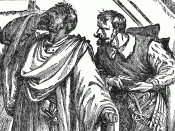Since the existence of mankind, humanity is what distinguishes us from all other living creatures. It is by humanity that we perceive ourselves to be the dominant species. Although humans believe they are above all, it is the natural instinct that humanity shares with all other living creatures. The only characteristic that classifies us as humans is our ability to reason. However, our capability to rationalize can be easily suppressed by our instinct.
In the tragedy of Othello, many animal references are made by Iago to the people he disrespects. The purpose of Shakespeare depicting Iago as a character who perceives others as animals is to show his dominance and his representation of mankind, illustrating his superiority over others. The interpretation of Iago signifying mankind reveals another side of him, his bestial nature.
From the beginning to the end of the play, Iago's reference to mammals is endless. In the opening scene of the tragedy, Iago makes an animal reference when talking to Brabantio, Desdemona's father.
He says to Brabantio, "Even now, now, very now, an old black ram is tupping your white ewe"ÃÂ (I.i.96-97). Iago continues with, "you'll have your daughter cover'd with a Barbary horse; you'll have your nephews neigh to you; you'll have coursers for cousins and gennets for germans"ÃÂ (I.i.123-126). It is considered to be insulting when an individual is compared to a mammal. Iago's disrespect for the general is evident early on in the play when he labels Othello as a "Barbary horse"ÃÂ.
Each phrase referring to an inhuman species can be understood as Iago's attempt to infuriate Brabantio. However, this cannot be true if Iago associates Othello to animals in his soliloquies. In his soliloquy at the end of Act I, Iago says "will as tenderly be led by th'nose as asses are"ÃÂ...
![From the Library of Congress: TITLE: Thos. W. Keene. Othello CALL NUMBER: POS - TH - 1884 .O7, no. 1 (C size) [P&P] REPRODUCTION NUMBER: LC-USZC6-58 (color film copy transparency) RIGHTS INFORMATION: No known restrictions on publication. MEDIUM: 1 print (](https://s.writework.com/uploads/9/94760/library-congress-title-thos-w-keene-othello-call-number-pos-thumb.jpg)

